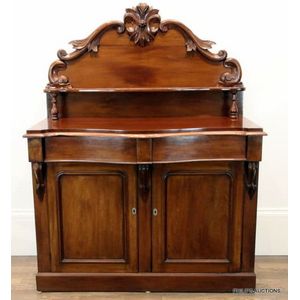1860 Cedar Chiffonier with Arched Back and Panelled Doors
A good Victorian cedar chiffonier, circa 1860, the chiffonier with an arched back, applied scroll decorations with crest, a shaped ledge and a conforming bow fronted top enclosing a frieze drawer above two panelled doors flanked by corbels and upon a plinth base. Height 156 cm, width 121 cm, depth 52 cm
You must be a subscriber, and be logged in to view price and dealer details.
Subscribe Now to view actual auction price for this item
When you subscribe, you have the option of setting the currency in which to display prices to $Au, $US, $NZ or Stg.
This item has been sold, and the description, image and price are for reference purposes only.
- Bow Front - The front is shaped in a gentle curve or bow. Introduced during the 18th century, the bow-front is associated with furniture of the Hepplewhite and Sheraton period, though of course the form continued to be used throughout the 19th century. Bow-fronted pieces are usually veneered, although some were cut from the solid wood. Where veneer is used, the carcase is cut either from pine or deal, or sometimes the front was built up and shaped with small timber 'bricks'. Commonly used on various types of furniture including chairs, settees, chests, side tables, sideboards and display cabinets.
- Corbel - An architectural term for a support for a projecting bracket, ostensibly supporting a beam or horizontal feature, but used in bookcases, sideboards and chests as a decorative element. Corbels are often carved with acanthus or other scrolling decoration.
- Victorian Period - The Victorian period of furniture and decorative arts design covers the reign of Queen Victoria from 1837 to 1901. There was not one dominant style of furniture in the Victorian period. Designers used and modified many historical styles such as Gothic, Tudor, Elizabethan, English Rococo, Neoclassical and others, although use of some styles, such as English Rococo and Gothic tended to dominate the furniture manufacture of the period.
The Victorian period was preceded by the Regency and William IV periods, and followed by the Edwardian period, named for Edward VII (1841 ? 1910) who was King of the United Kingdom and the British Dominions and Emperor of India for the brief period from 1901 until his death in 1910. - Frieze - An architectural term denoting the flat, shaped or convex horizontal surface of furniture, between the architrave and the cornice, usually found on a cabinet or bookcase, or on desks and tables where it may include drawers, the area between the top and the legs. In ceramics, the term refers to the banding, of usually a repeating pattern, on the rims of plates and vases.
- Plinth - The square or rectangular base of a piece of cabinet furniture, often ornamented with moulding. The plinth may be separate, as in some wardrobes or presses, and act as the support for the carcase. In a false plinth, the moulded boards may be attached directly to the piece. Furniture with a plinth base usually does not have separate feet. The term derives from architecture where it denotes the base of a column or statue.
- Circa - A Latin term meaning 'about', often used in the antique trade to give an approximate date for the piece, usually considered to be five years on either side of the circa year. Thus, circa 1900 means the piece was made about 1900, probably between 1895 and 1905. The expression is sometimes abbreviated to c.1900.
This item has been included into following indexes:
